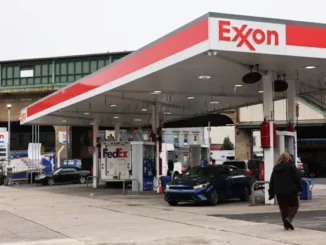
In a strategic move that underscores the growing role of U.S. energy giants in global markets, ExxonMobil has entered the Greek offshore exploration sector through a farm-in agreement for Block 2 in the northwestern Ionian Sea.
This deal, signed with Energean and HELLENiQ ENERGY, grants ExxonMobil a 60% stake in what is described as the largest unexplored offshore prospect in the Mediterranean, with initial exploratory drilling slated for late 2026 or early 2027, and potential first gas production in the early 2030s if discoveries prove viable.
The investment for this phase is estimated between $50 million and $100 million, marking a significant expansion of ExxonMobil’s footprint in Europe and aligning with broader trends in Mediterranean energy development.
The Oil and Gas Footprint in the Mediterranean
The Mediterranean Sea, particularly its eastern basin, has emerged as a hotspot for hydrocarbon reserves and production over the past decade. Egypt leads the region as the largest liquids producer, averaging 687,000 barrels per day from 2015 onward, bolstered by reserves exceeding 75.5 trillion cubic feet of natural gas.
To date, more than 2,000 billion cubic meters of natural gas have been discovered in Egypt’s Mediterranean sector alone, with fields like Zohr driving output.
Israel follows closely, with major assets such as the Leviathan gas field—located 47 kilometers southwest of the Tamar field—contributing to regional production.
Overall, confirmed natural gas reserves in the Mediterranean represent at least 1.7% of global proven reserves, amounting to substantial volumes that have attracted international players.
Greece, however, has lagged in this arena, producing only small volumes of oil and relying heavily on imports for its energy needs.
The Ionian Sea blocks, including Block 2, offer untapped potential, with historical estimates suggesting the broader region holds around 50 billion barrels of oil and 8 trillion cubic meters of gas—about 4% of world reserves as assessed in 2002.
This deal signals a revival in Greek offshore exploration, potentially positioning the country as a new contributor to Mediterranean energy dynamics amid declining production in established players like Egypt.
Significance of ExxonMobil’s Expansion for Greece
ExxonMobil’s entry into Greek waters is a game-changer for the nation’s energy sector, which has seen limited activity in recent years. By farming into Block 2, ExxonMobil brings advanced technology and expertise to explore deepwater prospects, paving the way for potential natural gas discoveries that could enhance Greece’s energy security and reduce dependence on imported fuels.
This move aligns with Greece’s efforts to extend its influence as an energy corridor across the Mediterranean, fostering regional stability through diversified supply chains.
Economically, the project could deliver substantial benefits. If commercially viable reserves are found, Greece stands to gain from royalties, taxes, and profit-sharing agreements typical in such concessions. While specific projections for Block 2 are preliminary, analogous developments in the region—such as Egypt’s Zohr field—have generated billions in revenue through production sharing.
For Greece, key deliverables include job creation in exploration and related industries, infrastructure investments, and long-term fiscal inflows estimated in the hundreds of millions annually if production ramps up in the 2030s.
This could provide a much-needed boost to the Greek economy, supporting sectors like shipping and manufacturing while contributing to EU energy transition goals through cleaner natural gas alternatives.
Potential Revenue and Benefits for ExxonMobil Investors
For ExxonMobil, this expansion diversifies its global portfolio beyond traditional strongholds, tapping into high-potential Mediterranean prospects amid a push for energy export dominance.
The company’s trailing twelve-month revenue stands at $324.92 billion, with a three-year growth rate of 6.8%, reflecting strong financial health to support such ventures.
Investors could see upside from new reserve additions if drilling succeeds, potentially adding billions in future cash flows from gas sales to European markets hungry for alternatives to Russian supplies.The deal enhances ExxonMobil’s competitive edge, with potential returns on the $50-100 million investment scaling significantly if reserves match regional benchmarks like Leviathan.
Benefits include portfolio resilience against volatility, increased shareholder value through dividends and buybacks, and alignment with global demand for LNG exports—areas where ExxonMobil already excels.
Today in Athens, @ExxonMobil signed a landmark deal with Greece’s @EnergeanPLC to restore offshore gas drilling in the Ionian Sea for the first time in more than 40 years.
The U.S. is proud to partner with Greece as we restore commonsense and unleash affordable, reliable, and… pic.twitter.com/osiQK6cA6a
— Secretary Chris Wright (@SecretaryWright) November 6, 2025
Impact on Secretary Chris Wright’s Energy Dominance Platform
This development resonates with U.S. Energy Secretary Chris Wright’s platform, which emphasizes unleashing American energy abundance through deregulation, boosted production, and international expansion.
Wright, sworn in early 2025, has prioritized cutting red tape, enhancing private sector investments, and promoting U.S. energy exports to restore global dominance.
ExxonMobil’s Greek venture exemplifies this by extending U.S. technological and financial influence abroad, strengthening alliances with NATO partners like Greece, and countering competitors in strategic regions.
By facilitating U.S. companies’ access to new reserves, the platform supports energy security for allies while driving domestic innovation in exploration tech.
This could amplify LNG export capabilities, aligning with Wright’s focus on nuclear, fossil fuels, and grid modernization to achieve “energy dominance” on a global scale.
Ultimately, such moves position the U.S. as a leader in energy services and exploration, benefiting both national interests and private investors.







